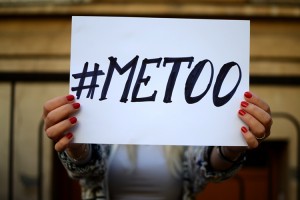#MeToo
January 18, 2018
In October 2017, claims of sexual harassment and misconduct among certain Hollywood personalities led to the explosion of a global social media movement known as Me Too. Also known by its internet hashtag #MeToo, the movement is a forum for victims of sexual assault to tell their personal experiences. The recent Me Too movement joined a similar movement of the same name that began years earlier. The vast numbers associated with #MeToo—the hashtag has been used millions of times on social media—have revealed the widespread problem of sexual harassment around the world. Through Me Too, millions of women—and men—have come forward to help ease the pain and guilt often felt by victims of sexual assault.

The Me Too movement began in 2006 and exploded on the social media scene in 2017. Credit: © Mihai Surdu, Shutterstock
Me Too was originally begun in 2006 by civil rights activist Tarana Burke to organize women of color against sexual abuse. Burke was inspired to use the phrase after being unable to respond to a young girl who confided to her that she had been sexually assaulted. Burke later wished she had simply told the girl, “me too.” Burke worked quietly on the issue for years, and is now senior director for Brooklyn’s Girls for Gender Equity (GGE), a nonprofit organization committed to the physical, psychological, social, and economic development of girls and women.
In 2017, as news broke of widespread sexual abuse in Hollywood, actress Alyssa Milano (unaware of Burke’s existing movement) wrote on Twitter, “If all the women who have been sexually harassed or assaulted wrote ‘Me too’ as a status, we might give people a sense of the magnitude of the problem.” The combined Me Too forces created a worldwide forum for victims of sexual abuse. Numerous Hollywood celebrities have been accused of inappropriate sexual behavior through Me Too, as have many people in government, the media and music industries, and other highly visible occupations.
Time magazine named the “silence breakers” of the #MeToo movement as the magazine’s collective Person of the Year for 2017. Sexual assault victims who speak out are silence breakers because many people keep quiet about the experience which caused them psychological and perhaps physical harm. The negative consequences of speaking out can be daunting, and often the perpetrators of sexual assault go unpunished.
Beyond the Me Too movement, sexual abuse scandals in churches, schools, and athletic organizations have emerged in numerous places, most recently in Australia, Chile, India, and the United States. The World Health Organization estimates that one in three women in the world has experienced sexual violence.


